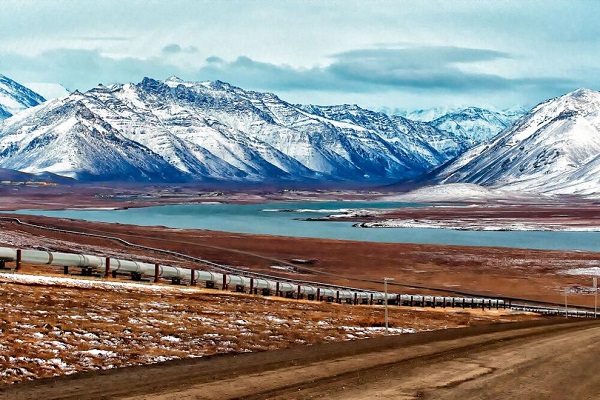Energy
Houses passes bill to protect domestic oil production, protect Iñupiat community

From T
Indigenous communities are advocating for economic development projects in the North Slope, explaining that more than 95% of their tax base comes from resource development infrastructure.
The U.S. House passed another a bill to advance domestic energy production, this time in response to cries for help from an indigenous community living in the Alaska North Slope.
The bill’s cosponsor, a Democrat from Alaska, did not vote for her own bill. It passed with the support of five Democrats, including two from Texas who are strong supporters of the U.S. oil and natural gas industry.
The U.S. House has advanced several bills and resolutions to support domestic U.S. oil and natural gas production, supported by Texas Democrats. They’ve done so after the Biden administration has taken more than 200 actions against the industry, The Center Square reported.
One includes the Department of the Interior restricting development on over 50% of the Arctic National Wildlife Refuge (ANWR), directly impacting the Iñupiat North Slope community.
The Alaska North Slope region includes a part of ANWR and National Petroleum Reserve-Alaska (NPRA). Both are home to the indigenous Iñupiat community who maintain that the Biden administration is trying to “silence indigenous voices in the Arctic.”
The plan to halt North Slope production was done through a federal agency rule change, a tactic the administration has used to change federal law bypassing Congress. The rule cancels seven oil and gas leases issued by the Trump administration in the name of “climate change.” Interior Secretary Deb Haaland said canceling the leases was “based on the best available science and in recognition of the Indigenous Knowledge of the original stewards of this area, to safeguard our public lands for future generations.”
The indigenous community strongly disagrees, saying they weren’t consulted before, during or after the rule change.
Nagruk Harcharek, president of the Voice of Arctic Iñupiat, a nonprofit that represents a collective elected Iñupiaq leadership, says the administration’s mandate “to ‘protect’ 13 million acres of our ancestral homelands was made without fulfilling legal consultative obligations to our regional tribal governments, without engaging our communities about the decision’s impact, and with an incomplete economic analysis that undercuts North Slope communities.”
He argues the administration has overlooked “the legitimate concerns of elected Indigenous leaders from Alaska’s North Slope. This is a continuation of the onslaught of being blindsided by the federal government about unilateral decisions affecting our homelands.”
Restricting NPR-A oil production is “yet another blow to our right to self-determination in our ancestral homelands, which we have stewarded for over 10,000 years. Not a single organization or elected leader on the North Slope, which fully encompasses the NPR-A, supports this proposed rule,” he said, adding that they asked for it to be rescinded.
In response, U.S. Reps. Mary Sattler Peltola, D-Alaska, and Pete Stauber, R-Minn., introduced HR 6285, “Alaska’s Right to Produce Act.” The U.S. House Committee on Natural Resources Subcommittee on Energy and Natural Resources held a hearing on the issue; members of the Iñupiat Community of the Arctic Slope and the Kaktovik Iñupiat Corporation testified.
Kaktovik Iñupiat Corporation president Charles Lampe said they “refuse to become conservation refugees on our own homelands and unapologetically stand behind the Alaska’s Right to Produce Act.”
The Kaktovik is the only community located in the ANWR. The North Slope Iñupiat have stewarded their ancestral homelands for thousands of years, predating the creation of the U.S. federal government, the Interior Department and the state of Alaska, they argue.
The indigenous communities are advocating for economic development projects in the North Slope, explaining that more than 95% of their tax base comes from resource development infrastructure. Tax revenue funds public school education, health clinics, water and sewage systems, wildlife management and research and other services that otherwise would not exist, they argue. Eliminating their tax base, will directly impact their lives and jeopardize their long-term economic security, they argue.
The House passed Alaska’s Right to Produce Act on Wednesday to reverse the rule change and establish the Coastal Plain oil and gas leasing program. It authorizes and directs federal agencies to administer oil and natural gas leasing on 13 million acres of public land in the North Slope.
The bill passed by a vote of 214-199 without the support of its Democratic cosponsor from Alaska, Peltola, who voted “present.”
Five Democrats voted for it: Sanford D. Bishop, Jr. of Georgia, Henry Cuellar and Vincente Gonzalez of Texas, Jared Golden of Maine and Marie Gluesenkamp Perez of Washington. One Republican voted against it, Rep. Brian Fitzpatrick of Pennsylvania.
After it passed, Harcharek said, “Since the Biden administration announced this decision in September, our voices, which overwhelmingly reject the federal government’s decisions, have been consistently drowned out and ignored. This administration has not followed its well-documented promises to work with Indigenous people when crafting policies affecting their lands and people. We are grateful to Congress for exercising its legislative authority to correct the federal government’s hypocrisy and advance Iñupiaq self-determination in our ancestral homelands.”
Kaktovik Mayor Nathan Gordon, Jr. said the administration “is regulating our homelands in a region they do not understand and without listening to the people who live here.” The new law is “a vital corrective measure that will prevent our community from being isolated and protect our Iñupiaq culture in the long term.”
The bill heads to the Democratic controlled Senate, where it is unlikely to pass.
Automotive
Politicians should be honest about environmental pros and cons of electric vehicles

From the Fraser Institute
By Annika Segelhorst and Elmira Aliakbari
According to Steven Guilbeault, former environment minister under Justin Trudeau and former member of Prime Minister Carney’s cabinet, “Switching to an electric vehicle is one of the most impactful things Canadians can do to help fight climate change.”
And the Carney government has only paused Trudeau’s electric vehicle (EV) sales mandate to conduct a “review” of the policy, despite industry pressure to scrap the policy altogether.
So clearly, according to policymakers in Ottawa, EVs are essentially “zero emission” and thus good for environment.
But is that true?
Clearly, EVs have some environmental advantages over traditional gasoline-powered vehicles. Unlike cars with engines that directly burn fossil fuels, EVs do not produce tailpipe emissions of pollutants such as nitrogen dioxide and carbon monoxide, and do not release greenhouse gases (GHGs) such as carbon dioxide. These benefits are real. But when you consider the entire lifecycle of an EV, the picture becomes much more complicated.
Unlike traditional gasoline-powered vehicles, battery-powered EVs and plug-in hybrids generate most of their GHG emissions before the vehicles roll off the assembly line. Compared with conventional gas-powered cars, EVs typically require more fossil fuel energy to manufacture, largely because to produce EVs batteries, producers require a variety of mined materials including cobalt, graphite, lithium, manganese and nickel, which all take lots of energy to extract and process. Once these raw materials are mined, processed and transported across often vast distances to manufacturing sites, they must be assembled into battery packs. Consequently, the manufacturing process of an EV—from the initial mining of materials to final assembly—produces twice the quantity of GHGs (on average) as the manufacturing process for a comparable gas-powered car.
Once an EV is on the road, its carbon footprint depends on how the electricity used to charge its battery is generated. According to a report from the Canada Energy Regulator (the federal agency responsible for overseeing oil, gas and electric utilities), in British Columbia, Manitoba, Quebec and Ontario, electricity is largely produced from low- or even zero-carbon sources such as hydro, so EVs in these provinces have a low level of “indirect” emissions.
However, in other provinces—particularly Alberta, Saskatchewan and Nova Scotia—electricity generation is more heavily reliant on fossil fuels such as coal and natural gas, so EVs produce much higher indirect emissions. And according to research from the University of Toronto, in coal-dependent U.S. states such as West Virginia, an EV can emit about 6 per cent more GHG emissions over its entire lifetime—from initial mining, manufacturing and charging to eventual disposal—than a gas-powered vehicle of the same size. This means that in regions with especially coal-dependent energy grids, EVs could impose more climate costs than benefits. Put simply, for an EV to help meaningfully reduce emissions while on the road, its electricity must come from low-carbon electricity sources—something that does not happen in certain areas of Canada and the United States.
Finally, even after an EV is off the road, it continues to produce emissions, mainly because of the battery. EV batteries contain components that are energy-intensive to extract but also notoriously challenging to recycle. While EV battery recycling technologies are still emerging, approximately 5 per cent of lithium-ion batteries, which are commonly used in EVs, are actually recycled worldwide. This means that most new EVs feature batteries with no recycled components—further weakening the environmental benefit of EVs.
So what’s the final analysis? The technology continues to evolve and therefore the calculations will continue to change. But right now, while electric vehicles clearly help reduce tailpipe emissions, they’re not necessarily “zero emission” vehicles. And after you consider the full lifecycle—manufacturing, charging, scrapping—a more accurate picture of their environmental impact comes into view.
Energy
Canada’s future prosperity runs through the northwest coast

From Resource Works
A strategic gateway to the world
Tucked into the north coast of B.C. is the deepest natural harbour in North America and the port with the shortest travel times to Asia.
With growing capacity for exports including agricultural products, lumber, plastic pellets, propane and butane, it’s no wonder the Port of Prince Rupert often comes up as a potential new global gateway for oil from Alberta, said CEO Shaun Stevenson.
Thanks to its location and natural advantages, the port can efficiently move a wide range of commodities, he said.
That could include oil, if not for the federal tanker ban in northern B.C.’s coastal waters.

“Notwithstanding the moratorium that was put in place, when you look at the attributes of the Port of Prince Rupert, there’s arguably no safer place in Canada to do it,” Stevenson said.
“I think that speaks to the need to build trust and confidence that it can be done safely, with protection of environmental risks. You can’t talk about the economic opportunity before you address safety and environmental protection.”
Safe transit at Prince Rupert
About a 16-hour drive from Vancouver, the Port of Prince Rupert’s terminals are one to two sailing days closer to Asia than other West Coast ports.
The entrance to the inner harbour is wider than the length of three Canadian football fields.
The water is 35 metres deep — about the height of a 10-storey building — compared to 22 metres at Los Angeles and 16 metres at Seattle.
Shipmasters spend two hours navigating into the port with local pilot guides, compared to four hours at Vancouver and eight at Seattle.
“We’ve got wide open, very simple shipping lanes. It’s not moving through complex navigational channels into the site,” Stevenson said.
A port on the rise
The Prince Rupert Port Authority says it has entered a new era of expansion, strengthening Canada’s economic security.
The port estimates it anchors about $60 billion of Canada’s annual global trade today. Even without adding oil exports, Stevenson said that figure could grow to $100 billion.
“We need better access to the huge and growing Asian market,” said Heather Exner-Pirot, director of energy, natural resources and environment at the Macdonald-Laurier Institute.
“Prince Rupert seems purpose-built for that.”
Roughly $3 billion in new infrastructure is already taking shape, including the $750 million rail-to-container CANXPORT transloading complex for bulk commodities like specialty agricultural products, lumber and plastic pellets.

Canadian propane goes global
A centrepiece of new development is the $1.35-billion Ridley Energy Export Facility — the port’s third propane terminal since 2019.
“Prince Rupert is already emerging as a globally significant gateway for propane exports to Asia,” Exner-Pirot said.
Thanks to shipments from Prince Rupert, Canadian propane – primarily from Alberta – has gone global, no longer confined to U.S. markets.
More than 45 per cent of Canada’s propane exports now reach destinations outside the United States, according to the Canada Energy Regulator.
“Twenty-five per cent of Japan’s propane imports come through Prince Rupert, and just shy of 15 per cent of Korea’s imports. It’s created a lift on every barrel produced in Western Canada,” Stevenson said.
“When we look at natural gas liquids, propane and butane, we think there’s an opportunity for Canada via Prince Rupert becoming the trading benchmark for the Asia-Pacific region.”
That would give Canadian production an enduring competitive advantage when serving key markets in Asia, he said.
Deep connection to Alberta
The Port of Prince Rupert has been a key export hub for Alberta commodities for more than four decades.
Through the Alberta Heritage Savings Trust Fund, the province invested $134 million — roughly half the total cost — to build the Prince Rupert Grain Terminal, which opened in 1985.
The largest grain terminal on the West Coast, it primarily handles wheat, barley, and canola from the prairies.

Today, the connection to Alberta remains strong.
In 2022, $3.8 billion worth of Alberta exports — mainly propane, agricultural products and wood pulp — were shipped through the Port of Prince Rupert, according to the province’s Ministry of Transportation and Economic Corridors.
In 2024, Alberta awarded a $250,000 grant to the Prince Rupert Port Authority to lead discussions on expanding transportation links with the province’s Industrial Heartland region near Edmonton.
Handling some of the world’s biggest vessels
The Port of Prince Rupert could safely handle oil tankers, including Very Large Crude Carriers (VLCCs), Stevenson said.
“We would have the capacity both in water depth and access and egress to the port that could handle Aframax, Suezmax and even VLCCs,” he said.
“We don’t have terminal capacity to handle oil at this point, but there’s certainly terminal capacities within the port complex that could be either expanded or diversified in their capability.”
Market access lessons from TMX
Like propane, Canada’s oil exports have gained traction in Asia, thanks to the expanded Trans Mountain pipeline and the Westridge Marine Terminal near Vancouver — about 1,600 kilometres south of Prince Rupert, where there is no oil tanker ban.
The Trans Mountain expansion project included the largest expansion of ocean oil spill response in Canadian history, doubling capacity of the West Coast Marine Response Corporation.

The Canada Energy Regulator (CER) reports that Canadian oil exports to Asia more than tripled after the expanded pipeline and terminal went into service in May 2024.
As a result, the price for Canadian oil has gone up.
The gap between Western Canadian Select (WCS) and West Texas Intermediate (WTI) has narrowed to about $12 per barrel this year, compared to $19 per barrel in 2023, according to GLJ Petroleum Consultants.
Each additional dollar earned per barrel adds about $280 million in annual government royalties and tax revenues, according to economist Peter Tertzakian.
The road ahead
There are likely several potential sites for a new West Coast oil terminal, Stevenson said.
“A pipeline is going to find its way to tidewater based upon the safest and most efficient route,” he said.
“The terminal part is relatively straightforward, whether it’s in Prince Rupert or somewhere else.”
Under Canada’s Marine Act, the Port of Prince Rupert’s mandate is to enable trade, Stevenson said.
“If Canada’s trade objectives include moving oil off the West Coast, we’re here to enable it, presuming that the project has a mandate,” he said.
“If we see the basis of a project like this, we would ensure that it’s done to the best possible standard.”
This article originally appeared in Canadian Energy Centre
Resource Works News
-

 Alberta17 hours ago
Alberta17 hours agoThe Recall Trap: 21 Alberta MLA’s face recall petitions
-

 Fly Straight - John Ivison2 days ago
Fly Straight - John Ivison2 days agoMPs who cross the floor are dishonourable members
-

 Energy24 hours ago
Energy24 hours agoCanada’s future prosperity runs through the northwest coast
-

 illegal immigration17 hours ago
illegal immigration17 hours agoUS Notes 2.5 million illegals out and counting
-

 International17 hours ago
International17 hours agoTyler Robinson shows no remorse in first court appearance for Kirk assassination
-

 2025 Federal Election2 days ago
2025 Federal Election2 days agoToo Close for Comfort: Carney Floor Crosser Comes From a Riding Tainted by PRC Interference
-

 illegal immigration1 day ago
illegal immigration1 day agoEXCLUSIVE: Canadian groups, First Nation police support stronger border security
-

 Business1 day ago
Business1 day agoBrutal economic numbers need more course corrections from Ottawa











